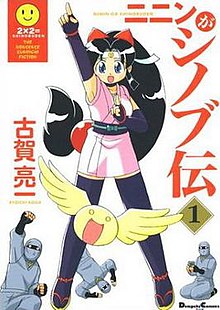| Ninja Nonsense: The Legend of Shinobu | |
 Cover of volume 1 of Ninja Nonsense as published by MediaWorks, featuring Shinobu and Onsokumaru | |
| ニニンがシノブ伝 (Ninin ga Shinobuden) | |
|---|---|
| Genre | Comedy[1] |
| Manga | |
| Ninin Ga Shinobuden | |
| Written by | Ryoichi Koga |
| Published by | MediaWorks |
| English publisher | |
| Imprint | Dengeki Comics EX |
| Magazine | Dengeki Daioh |
| Demographic | Shōnen |
| Original run | July 18, 2000 – January 21, 2006 |
| Volumes | 4 |
| Anime television series | |
| Directed by |
|
| Written by | Ryunosuke Kingetsu |
| Studio | Ufotable |
| Licensed by | |
| Original network | CBC |
| English network | |
| Original run | July 8, 2004 – September 23, 2004 |
| Episodes | 12 |
| Manga | |
| Ninin ga Shinobuden Plus | |
| Written by | Ryoichi Koga |
| Published by | Kadokawa Corporation |
| Magazine | Comic Newtype |
| Demographic | Seinen |
| Original run | June 26, 2020 – present |
| Volumes | 2 |
Ninja Nonsense: The Legend of Shinobu (ニニンがシノブ伝, Ninin ga Shinobuden), also known as 2×2 = Shinobuden, is a Japanese manga series written and illustrated by Ryoichi Koga. The series subtitle is "The Nonsense Kunoichi Fiction". The manga was serialized in MediaWorks' Dengeki Daioh magazine between August 2000 and March 2006; the chapters were later compiled into four tankōbon volumes. The manga was released in English in North America by Infinity Studios under the title Ninin Ga Shinobuden. A 12-episode anime adaptation produced by Ufotable aired in Japan between July and September 2004. The anime has been released in North America by The Right Stuf International under the title Ninja Nonsense: The Legend of Shinobu. A sequel manga titled Ninin ga Shinobuden Plus began serialization on Kadokawa Corporation's Comic Newtype website in June 2020.
Ninja Nonsense is an absurdist comedy series which follows a young woman named Shinobu as she trains to become a ninja. However, the series does not only focus on ninja training, but also focuses on Shinobu's lifestyle and friends through a series of disjointed comedic plot lines. The series uses character designs that favor a soft and rounded look rather than the slender bishōjo style. The original title of the series is based on a pun. In the Japanese numerical system, ni is two, and shi is four. Ni (2) × ni (2) = shi (4), therefore Ni-ni-n ga Shi-nobuden.
- ^ "Ninja Nonsense: The Legend of Shinobu DVD". Nozomi Entertainment. Retrieved June 21, 2020.